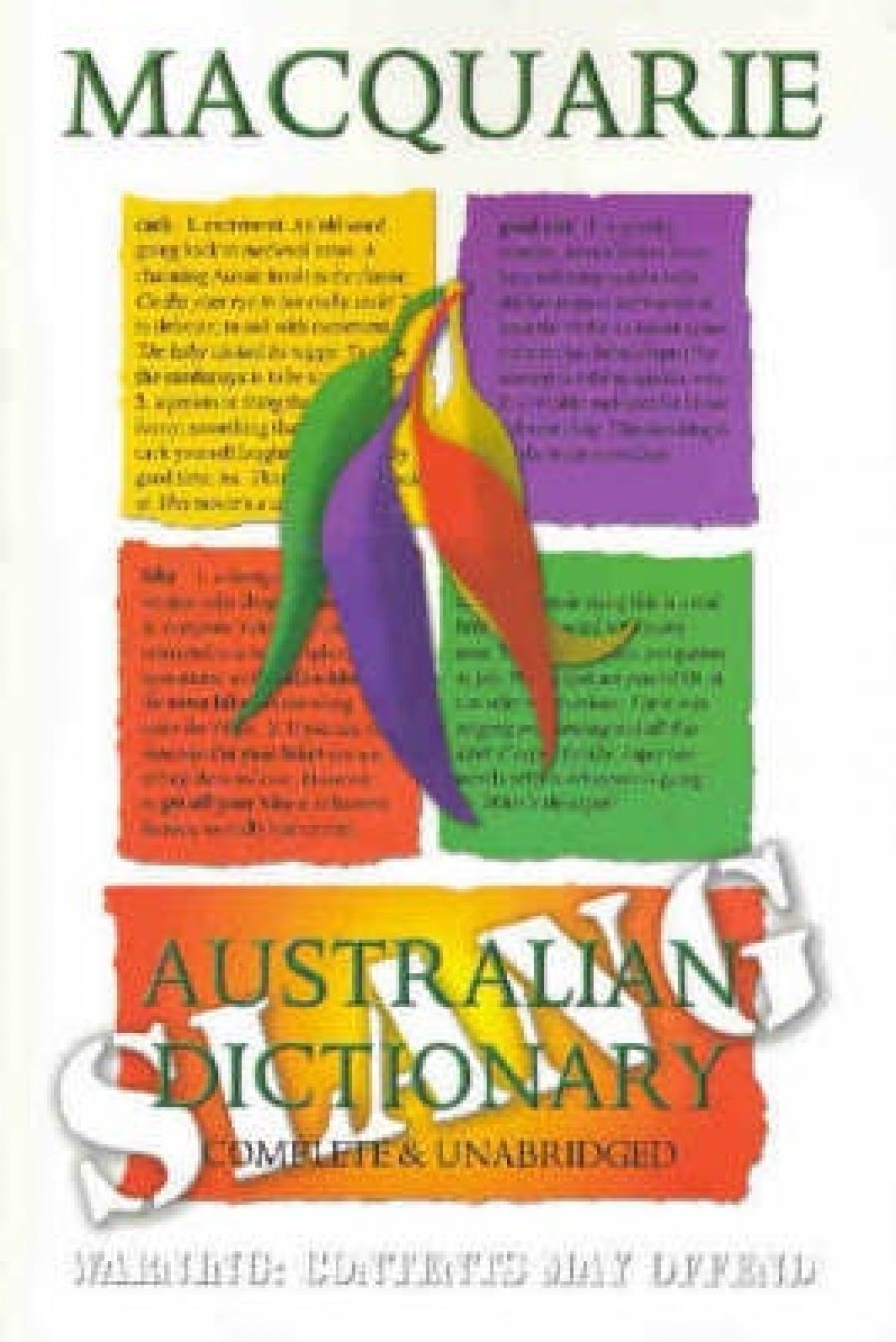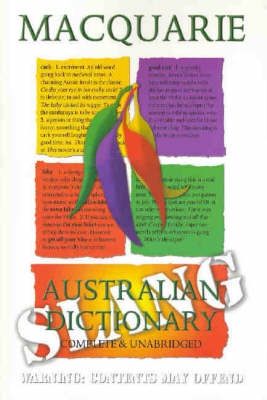
- Free Article: No
- Contents Category: Language
- Review Article: Yes
- Article Title: Fear of Judgment
- Online Only: No
- Custom Highlight Text:
The Macquarie Dictionary was first published with great fanfare in 1981. Three years later, the publishers, Macquarie Library, since taken over by Macmillan, issued an offshoot of the main dictionary bearing the twee marketing-driven title Aussie Talk. The more formal explanatory subtitle, The Macquarie Dictionary of Australian Colloquialisms, gave a clearer idea of the scope of the book and also revealed that it was intended to compete with Professor Gerry Wilkes’s very successful Dictionary of Australian Colloquialisms, which had been published in 1978.
- Book 1 Title: Macquarie Australian Slang Dictionary
- Book 1 Biblio: Macquarie, $19.95 pb, 235 pp
- Book 1 Cover Small (400 x 600):

- Book 1 Cover (800 x 1200):

This parade of name changes, which has its amusing side, is a product of an intellectual fuzziness that marked the original Macquarie Dictionary. Its editors were trained in the linguistics of the 1950s and 1960s, which had a strong Bloomfieldian bent. The influential linguist Leonard Bloomfield applied to language study the behaviouristic principles that predominated in US science from the 1920s to the 1950s, as we have been reminded by the new film Kinsey. Linguists of the period preened themselves on a policy of accepting all usage, however illiterate, nonsensical or stupid. Usage was what people said or wrote, and it was not the job of the linguist to condemn or reprove. Of course, to justify this laissez-faire policy, they constructed a straw-man opponent, the prescriptivist – in their eyes the intellectual equivalent of the cane-wielding schoolmaster and -mistress of their day – who sought indefatigably to impose Latin-derived grammar on the recalcitrant English language. It escaped their notice that there is a considerable leap from recording accurately and analysing people’s actual speech, which the linguist should of course do, to saying that all usage is equally effective or valid. The transfer of this laissez-faire linguistic doctrine to education had disastrous consequences, which continue to this day.
Armed with this fear of judgement, the Macquarie editors refused to distinguish between colloquial, slang, and taboo, and lumped all such words together under the single ‘restrictive’ label colloq., with predictably intellectually obfuscating results. Almost all speakers know that there is a difference in register and tone between, say, ‘arsehole’ and ‘flapper’; yet the Macquarie maintained that there wasn’t. Sometimes the label was just plain wrong. Whatever else they may be, ‘fuck’ and ‘cunt’ are not ‘colloquial’, as a hypothetical foreign user of the Macquarie Dictionary would soon learn if he innocently followed the Macquarie prescription on these words. It is this wilful renunciation of a proper task of the lexicographer that lies behind the uncertainty evidenced in the constant change of name. However, they did finally admit the utility, indeed, indispensability of the concept and term ‘slang’.
The latest version, Macquarie Australian Slang Dictionary, is far more complete than its predecessors, but then it should be, given the important dictionaries that have been published since 1988. The Macquarie has a good deal of new material and is particularly strong on children’s games and linguistic play, Antarctic slang and young people’s slang. It has all the names for beer-glass sizes that vary confusingly throughout Australia, but misses New South Wales’s ‘pony’ (a 7 oz. glass). Some classes of persons and things seem to attract multiple slang names, and a welcome new feature is synonymies illustrating this logorrhoeic bounteousness, as at ‘Toorak tractor’, ‘fuck-truck’ and ‘dung-puncher’. That at ‘sluggos’ (speedos) is astonishing. ‘Sluggos’ has the variants ‘sluggies’, ‘sluggers’ and ‘slug-hugger’, the last revealing the etymology (‘slug’, penis) and the idea or metaphor behind the other twenty-four synonyms (‘budgie-smugglers’, ‘cock-jocks’, ‘dick-pointers’ or ‘-pokers’ and so on).
Like the big Macquarie Dictionary, this slang dictionary follows the US lexicographical tradition of recording whatever is used in Australia, regardless of its origins, and presenting it under the title ‘Australian’. We are sometimes told that items are of British or US origin, though little attempt is made to indicate the extent to which they are naturalised. I doubt that ‘fudge-packer’ has much currency in Australia or that many Australians know what a ‘fluffer’ does for a crust. The editors know that some terms are actually Australian, that is, of Australian origin and sometimes only used here. So words are labelled Australian; however, this is not done consistently, and some Australianisms go unmarked, while some of the terms labelled Australian are not in fact Australianisms (‘Dickless Tracy’, ‘schooner’, ‘leg-opener’, ‘Aristotle’ (= arse)).
Occasionally, the definition is not quite accurate. ‘Boyf’ is defined as ‘a teenage girl’s boyfriend’, but the word is also used by gay men. An ‘APC’, a quick washing of the armpits and crotch (a ‘whore’s bath’, not given), is not necessarily done ‘from a bucket of water (often cold)’. ‘Gaydar’ is not simply ‘the ability to recognise gay men at sight’ but rather a gay man’s ability to discern another’s homosexuality (what used to be expressed by the catch-phrase ‘It takes one to know one’). Bush is not called ‘Dubya’ from ‘the US pronunciation of his middle initial’ but from an illiterate US pronunciation of that letter which the man himself uses or is believed to use. The senses given of ‘dumb down’ miss the main point, which is the lowering of educational or intellectual standards. The sexual slang term ‘action’ does not mean ‘potentially sexually available people’ but ‘sexual activity, fucking’ or the prospects of such activity (‘Is there much action at that beat?’ ‘Did you get much action on holidays?’). Nor does ‘duchess’ mean ‘to entertain grandly in order to improve your social or political standing’. Used in the passive, it refers to a person’s being overwhelmed and rendered ineffectual by a grand reception and entertainment. The entry ‘dry-root’ misses the common sense, to root without lubrication.
The Macquarie Australian Slang Dictionary records ‘rumpy-pumpy’ (sexual intercourse), but misses the related ‘rumpo’. It has ‘footsies’ but not ‘kneesies’ or, surprisingly, the Australian ‘handies’ (dated from a time when even hand-holding was thought daring). It lists, correctly, as Australian ‘crack on to’, but fails to record the synonymous Australianism ‘con on to’. Nor does the Australian ‘be on with’, to be involved in a steady relationship with (‘he was sort of on with Doc but it petered out’), make it. Of course, as will be apparent, there is no lexicographical prudery in this Macquarie dictionary. Still, it seems to take a long time to catch up with semantic repletion of sexual vocabulary: ‘bar’, ‘bar up’ and ‘barred up’, ‘tool’ to fuck, ‘back-up’ gang-bang, ‘caving’, ‘clam-diving’, cunnilinctus, to mention just a few Australian terms, have not been collected. As with all dictionaries, the claimed degree of completeness is relative.
It was clearly a policy decision that the dictionary is characterised by a marked informality of tone, including expressions of opinion (not everyone will agree that the Anzac biscuit is ‘a culinary treat beyond compare’) and direct addresses to the reader, for example, at ‘gash’ and ‘dropkick’ (‘I bet you didn’t know you were being so rude!’, this because the word is the elliptical form of ‘dropkick and punt’, rhyming slang with ‘cunt’). This sometimes fails dismally, as with the rant against a folk-etymology at ‘brass-monkey weather’ and the needless offensiveness at ‘North Shore’ (‘noted for its prevalence of boring farts’). This more relaxed tone is presumably thought to be more user-friendly; it is in fact not easy to get it right, and one needs to know when to stop.


Comments powered by CComment